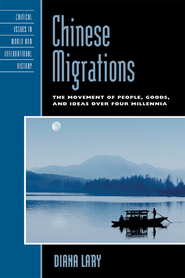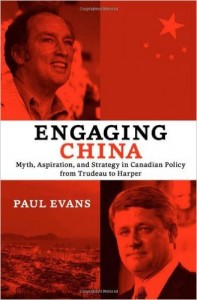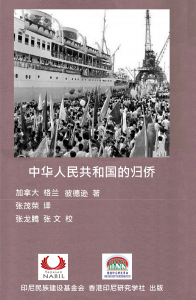The Book of Swindles: Selections from a Late Ming Collection
By Zhang Yingyu (fl. 1600s), translated by Christopher Rea and Bruce Rusk (Department of Asian Studies, UBC)
New York, NY: Columbia University Press, 2017
“What’s the oldest scam in the book? Nobody knows, but at least we have the oldest book about scams in China. It’s called The Book of Swindles, and finally, after four hundred years, Rea and Rusk have presented us with a vivid and entertaining new translation of this classic. Even the chapter titles—’Eating Human Fetuses to Fake Fasting’; ‘Swindling the Salt Commissioner While Disguised as Daoists’—are as priceless as anything else produced during the Ming dynasty.” — Peter Hessler
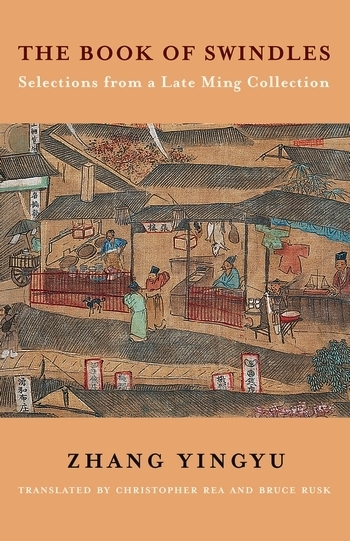 This is an age of deception. Con men ply the roadways. Bogus alchemists pretend to turn one piece of silver into three. Devious nuns entice young women into adultery. Sorcerers use charmed talismans for mind control and murder. A pair of dubious monks extorts money from a powerful official and then spends it on whoring. A rich student tries to bribe the chief examiner, only to hand his money to an imposter. A eunuch kidnaps boys and consumes their “essence” in an attempt to regrow his penis. These are just a few of the entertaining and surprising tales to be found in this seventeenth-century work, said to be the earliest Chinese collection of swindle stories.
This is an age of deception. Con men ply the roadways. Bogus alchemists pretend to turn one piece of silver into three. Devious nuns entice young women into adultery. Sorcerers use charmed talismans for mind control and murder. A pair of dubious monks extorts money from a powerful official and then spends it on whoring. A rich student tries to bribe the chief examiner, only to hand his money to an imposter. A eunuch kidnaps boys and consumes their “essence” in an attempt to regrow his penis. These are just a few of the entertaining and surprising tales to be found in this seventeenth-century work, said to be the earliest Chinese collection of swindle stories.
The Book of Swindles, compiled by an obscure writer from southern China, presents a fascinating tableau of criminal ingenuity. The flourishing economy of the late Ming period created overnight fortunes for merchants—and gave rise to a host of smooth operators, charlatans, forgers, and imposters seeking to siphon off some of the new wealth. The Book of Swindles, which was ostensibly written as a manual for self-protection in this shifting and unstable world, also offers an expert guide to the art of deception. Each story comes with a commentary by the author, Zhang Yingyu, who expounds a moral lesson while also speaking as a connoisseur of the swindle. This volume, which contains annotated translations of just over half of the eighty-odd stories in Zhang’s original collection, provides a wealth of detail on social life during the late Ming and offers words of warning for a world in peril.
Chinese History and Culture: Seventeenth-Century Through Twentieth Century
By Ying-shih Yü. With the Editorial Assistance of Josephine Chiu-Duke and Michael S. Duke (Department of Asian Studies, UBC)
Columbia University Press, September 2016
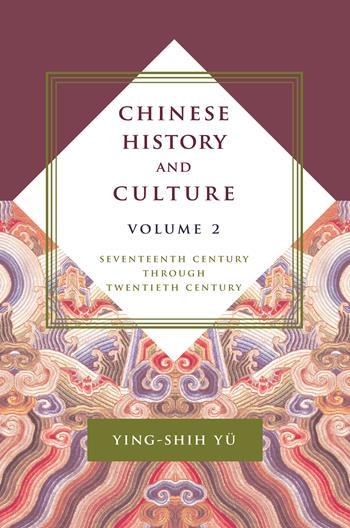 Chinese History and Culture is an indispensable two-volume resource for scholars of China. The books arrange the most significant works of a legendary Sinologist into a comprehensive course on Chinese civilization. Volume 2 of Chinese History and Culturecompletes Ying-shih Yü’s systematic reconstruction and exploration of Chinese thought over two millennia and its impact on Chinese identity. Essays address the rise of Qing Confucianism, the development of the Dai Zhen and Zhu Xi traditions, and the response of the historian Zhang Xuecheng to the Dai Zhen approach. They take stock of the thematic importance of Cao Xueqin’s eighteenth-century masterpiece Honglou meng (Dream of the Red Chamber) and the significant influence of Sun Yat-sen’s Three Principles of the People, as well as the radicalization of China in the twentieth century and the fundamental upheavals of modernization and revolution.
Chinese History and Culture is an indispensable two-volume resource for scholars of China. The books arrange the most significant works of a legendary Sinologist into a comprehensive course on Chinese civilization. Volume 2 of Chinese History and Culturecompletes Ying-shih Yü’s systematic reconstruction and exploration of Chinese thought over two millennia and its impact on Chinese identity. Essays address the rise of Qing Confucianism, the development of the Dai Zhen and Zhu Xi traditions, and the response of the historian Zhang Xuecheng to the Dai Zhen approach. They take stock of the thematic importance of Cao Xueqin’s eighteenth-century masterpiece Honglou meng (Dream of the Red Chamber) and the significant influence of Sun Yat-sen’s Three Principles of the People, as well as the radicalization of China in the twentieth century and the fundamental upheavals of modernization and revolution.
Ying-shih Yü also discusses the decline of elite culture in modern China, the relationships among democracy, human rights, and Confucianism, and changing conceptions of national history. He reflects on the Chinese approach to history in general and the larger political and cultural function of chronological biographies. He situates China’s modern encounter with the West in a wider historical frame to explain its more curious turns, and he contemplates the importance of a renewed interest in the traditional Chinese values recognizing common humanity and human dignity.
The Intellectual in Modern Chinese History
By Timothy Cheek (Institute of Asian Research/Department of History, UBC)
NY: Cambridge University Press, 2016
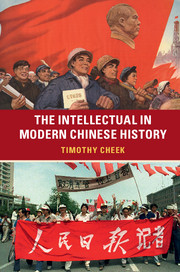 This vivid narrative history of Chinese intellectuals and public life provides a guide to making sense of China today. Timothy Cheek presents a map and a method for understanding the intellectual in the long twentieth century, from China’s defeat in the Sino-Japanese war in 1895 to the ‘Prosperous China’ since the 2008 Beijing Olympics. Cheek surveys the changing terrain of intellectual life over this transformative century in Chinese history to enable readers to understand a particular figure, idea or debate. The map provides coordinates to track different times, different social worlds and key concepts. The historical method focuses on context and communities during six periods to make sense of ideas, institutions and individual thinkers across the century. Together they provide a memorable account of the scenes and protagonists, and arguments and ideas, of intellectuals and public life in modern China.
This vivid narrative history of Chinese intellectuals and public life provides a guide to making sense of China today. Timothy Cheek presents a map and a method for understanding the intellectual in the long twentieth century, from China’s defeat in the Sino-Japanese war in 1895 to the ‘Prosperous China’ since the 2008 Beijing Olympics. Cheek surveys the changing terrain of intellectual life over this transformative century in Chinese history to enable readers to understand a particular figure, idea or debate. The map provides coordinates to track different times, different social worlds and key concepts. The historical method focuses on context and communities during six periods to make sense of ideas, institutions and individual thinkers across the century. Together they provide a memorable account of the scenes and protagonists, and arguments and ideas, of intellectuals and public life in modern China.
The Age of Irreverence: A New History of Laughter in China
Christopher Rea (Department of Asian Studies, UBC)
Oakland, CA: University of California Press, 2015
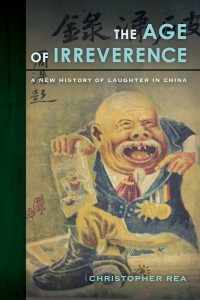
The Age of Irreverence tells the story of why China’s entry into the modern age was not just traumatic, but uproarious. Christopher Rea argues that this period—from the 1890s to the 1930s—transformed how Chinese people thought and talked about what is funny. Focusing on five cultural expressions of laughter—jokes, play, mockery, farce, and humor—he reveals the textures of comedy that were a part of everyday life during modern China’s first “age of irreverence.” This new history of laughter not only offers an unprecedented and up-close look at a neglected facet of Chinese cultural modernity, but also reveals its lasting legacy in the Chinese language of the comic today and its implications for our understanding of humor as a part of human culture.
China’s Literary Cosmopolitans: Qian Zhongshu, Yang Jiang, and the World of Letters
Christopher Rea (ed.) (Department of Asian Studies, UBC)
Brill: 2015
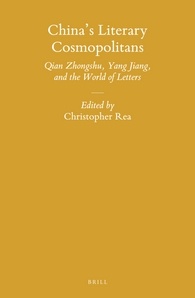
China’s Literary Cosmopolitans offers a comprehensive introduction to the literary oeuvres of Qian Zhongshu (1910-98) and Yang Jiang (b. 1911). It assesses their novels, essays, stories, poetry, plays, translations, and criticism, and discusses their reception as two of the most important Chinese scholar-writers of the twentieth century.
In addition to re-evaluating this married couple’s intertwined literary careers, the book also explains why they have come to represent such influential models of Chinese literary cosmopolitanism. Uncommonly well-versed in Western languages and literatures, Qian and Yang chose to live in China and write in Chinese. China’s Literary Cosmopolitans argues for their artistic importance while analyzing their works against the modern cultural imperative that Chinese literature be worldly.
China’s Civil War: A Social History, 1945–1949
Diana Lary (Department of History, UBC)
NY: Cambridge University Press, March 2015
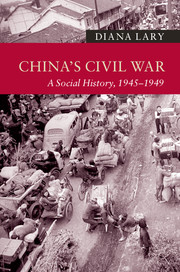 China’s Civil War is the first book of its kind to offer a social history in English of the Civil War in 1945–9 that brought the Chinese Communist Party to power. Integrating history and memory, it surveys a period of intense upheaval and chaos to show how the Communist Party and its armies succeeded in overthrowing the Nationalist government to bring political and social revolution to China. Drawing from a collection of biographies, memoirs, illustrations and oral histories, Diana Lary gives a voice to those who experienced the war first-hand, exemplifying the direct effects of warfare – the separations and divisions, the exiles and losses, and the social upheaval that resulted from the conflict. Lary explores the long-term impact on Chinese societies on the Mainland, Taiwan and Hong Kong, which have all diverged far from pre-war Chinese society.
China’s Civil War is the first book of its kind to offer a social history in English of the Civil War in 1945–9 that brought the Chinese Communist Party to power. Integrating history and memory, it surveys a period of intense upheaval and chaos to show how the Communist Party and its armies succeeded in overthrowing the Nationalist government to bring political and social revolution to China. Drawing from a collection of biographies, memoirs, illustrations and oral histories, Diana Lary gives a voice to those who experienced the war first-hand, exemplifying the direct effects of warfare – the separations and divisions, the exiles and losses, and the social upheaval that resulted from the conflict. Lary explores the long-term impact on Chinese societies on the Mainland, Taiwan and Hong Kong, which have all diverged far from pre-war Chinese society.
Chinese Migrations: The Movement of People, Goods, and Ideas over Four Millennia
By: Diana Lary (Department of History, UBC)
Rowman & Littlefield, 2015
The Confucian tradition treated migration as undesirable. It praised the delights of staying at home: “A thousand days at home are good, half a day away is hard.” Lary argues that, despite this view, migration has been a key element in the evolution of Chinese society, one that the state disparages and encourages at the same time. Her book will be compelling for all readers who want to understand the context for the present internal and international migrations that have changed the face of China itself and its international relations.
The Business of Culture: Cultural Entrepreneurs in China and Southeast Asia, 1900-65
By: Christopher Rea & Nicolai Volland (ed.)
UBC Press, 2015
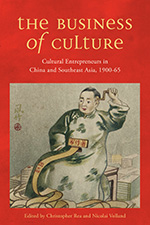 From the late nineteenth to the mid-twentieth century, changes in mass media, transportation, and communication technologies provided unprecedented opportunities for the entrepreneurially minded in China and Southeast Asia.
From the late nineteenth to the mid-twentieth century, changes in mass media, transportation, and communication technologies provided unprecedented opportunities for the entrepreneurially minded in China and Southeast Asia.
The Business of Culture examines the rise of these “cultural entrepreneurs,” Chinese business people who risked financial well-being and reputation by investing in multiple enterprises to build cultural, social, or financial capital. Featuring ten interlinked case studies, this volume introduces readers to three distinct archetypes who emerged during this time: the cultural personality, the tycoon, and collective enterprise. These include the likes of Lü Bicheng, a famous classical poet, who parlayed her literary prestige into a career as the principal of a Beijing girls’ school and then used her business fortune to build a high-profile persona as a glamorous foreign correspondent; Aw Boon Haw, the “tiger” behind the Tiger Brand pharmaceutical company; and the Shaw Brothers, ethnic Chinese filmmakers and exhibitors who drew thousands of people out each night to watch movies in Singapore and British Malaya.
Collectively, these portraits reveal how changes in social and economic conditions created the fertile soil for business success; conditions that are similar to those emerging in China today.
Engaging China: Myth, Aspiration, and Strategy in Canadian Policy from Trudeau to Harper
Paul Evans (Institute of Asian Research/Liu Institute of Global Affairs, UBC)
University of Toronto Press, 2014
For more than four decades, engagement has been the bedrock of Canada’s policy toward China, as Ottawa has attempted to assist China’s entry into the international system and advance a commercial agenda. More than just high policy, engagement has also been a recurrent narrative that sees changing China as a moral enterprise as important as trade and diplomacy.
As global China’s economic and diplomatic reach has expanded, policy makers in Ottawa have not fashioned an effective response. They are failing to produce a compelling strategy that addresses the power shift underway and growing public anxiety about China at home.
Evans’s assessment of the evolution of Canada’s China policy speaks to the intellectual history of the idea of “engagement,” and assesses its internal contradictions and possibilities. He provides the elements of a comprehensive and strategic approach to China’s central role in the most important power shift in the global order since World War II.
Accessing Treaty Performance in China: Trade and Human Rights
Pitman B. Potter (Allard School of Law, UBC)
UBC Press, 2014
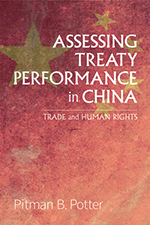 Closer and more frequent contact among states brought about by globalization has led to an increase in trade and human rights disputes that can challenge economic relations and cloud political relationships. Preventing and managing these disputes requires a better understanding of the cross-cultural dimensions of treaty performance on trade and human rights, especially for increasingly important actors in the international system such as China.
Closer and more frequent contact among states brought about by globalization has led to an increase in trade and human rights disputes that can challenge economic relations and cloud political relationships. Preventing and managing these disputes requires a better understanding of the cross-cultural dimensions of treaty performance on trade and human rights, especially for increasingly important actors in the international system such as China.
Assessing Treaty Performance in China outlines a new approach for understanding China’s treaty performance around international standards on trade and human rights, using the paradigms of selective adaptation and institutional capacity. Selective adaptation reveals how local interpretation and implementation of international treaty standards are affected by normative perspectives derived from perception, complementarity, and legitimacy. Institutional capacity explains how operational dimensions of legal performance are affected by structural and relational dynamics of institutional purpose, location, orientation, and cohesion.
The book focuses on legal performance rather than technical compliance to provide a more comprehensive perspective on China’s interaction with international treaty standards. It also offers policy suggestions for more effective engagement with China on trade and human rights issues.
China’s Legal System
By: Pitman B. Potter (Allard School of Law, UBC)
Cambridge: Polity Press, 2014
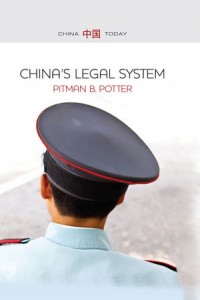 China’s struggle for the rule of law is at a critical juncture. As a key element of governance in the PRC today, China’s legal system affects not only domestic affairs but also China’s engagement with the world. But can a credible legal system emerge which protects the rights of citizens and international partners without undermining the power of the Party State? And is the Chinese Communist Party willing to embark on judicial reforms that may jeopardize its very survival?
China’s struggle for the rule of law is at a critical juncture. As a key element of governance in the PRC today, China’s legal system affects not only domestic affairs but also China’s engagement with the world. But can a credible legal system emerge which protects the rights of citizens and international partners without undermining the power of the Party State? And is the Chinese Communist Party willing to embark on judicial reforms that may jeopardize its very survival?
Understanding the PRC legal system is increasingly important as China rises to prominence in the world. In this compelling analysis, noted legal scholar Pitman Potter examines the ideals and practices of China’s legal regime, in light of international standards and local conditions. Against a rich historical backdrop, Potter explains how China’s legal system supports three key policy objectives; namely, political stability, economic prosperity, and social development. In exploring these competing policy goals and the tensions between them, he also raises fundamental questions about government expectations of the role of law in regulating local and international socio-economic and political relationships.
This wide-ranging and readable introduction will be an invaluable guide for students and non-specialists interested in China’s ongoing process of legal modernization.
Trying Not to Try: Ancient China, Modern Science and the Power of Spontaneity
By: Edward Slingerland (Department of Asian Studies, UBC)
New York: Crown (Random House), 2014
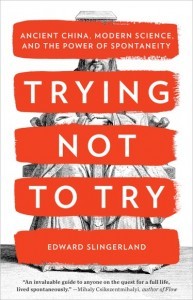 In Trying Not To Try, Edward Slingerland explains why we find spontaneity so elusive, and shows how early Chinese thought points the way to happier, more authentic lives. We’ve long been told that the way to achieve our goals is through careful reasoning and conscious effort. But recent research suggests that many aspects of a satisfying life, like happiness and spontaneity, are best pursued indirectly. The early Chinese philosophers knew this, and they wrote extensively about an effortless way of being in the world, which they called wu-wei (ooo-way). They believed it was the source of all success in life, and they developed various strategies for getting it and hanging on to it.
In Trying Not To Try, Edward Slingerland explains why we find spontaneity so elusive, and shows how early Chinese thought points the way to happier, more authentic lives. We’ve long been told that the way to achieve our goals is through careful reasoning and conscious effort. But recent research suggests that many aspects of a satisfying life, like happiness and spontaneity, are best pursued indirectly. The early Chinese philosophers knew this, and they wrote extensively about an effortless way of being in the world, which they called wu-wei (ooo-way). They believed it was the source of all success in life, and they developed various strategies for getting it and hanging on to it.
With clarity and wit, Slingerland introduces us to these thinkers and the marvelous characters in their texts, from the butcher whose blade glides effortlessly through an ox to the wood carver who sees his sculpture simply emerge from a solid block. Slingerland uncovers a direct line from wu-wei to the Force in Star Wars, explains why wu-wei is more powerful than flow, and tells us what it all means for getting a date. He also shows how new research reveals what’s happening in the brain when we’re in a state of wu-wei—why it makes us happy and effective and trustworthy, and how it might have even made civilization possible.
An Intellectual History of China, Volume One: Knowledge, Thought, and Belief before the Seventh Century CE
By: Ge Zhaoguang (Fudan University); Translated by Michael S.Duke & Josephine Chiu-Duke (Department of Asian Studies, UBC)
Brill, 2014
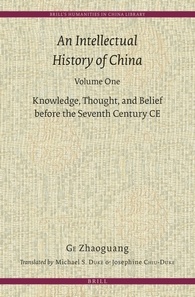
In An Intellectual History of China, Professor Ge Zhaoguang presents a history of traditional Chinese knowledge, thought and belief to the late six century CE with a new approach offering a new perspective. It appropriates a wide range of source materials and emphasizes the necessity of understanding ideas and thought in their proper historical contexts. Its analytical narrative focuses on the dialectical interaction between historical background and intellectual thought. While discussing the complex dynamics of interaction among the intellectual thought of elite Chinese scholars, their historical conditions, their canonical texts and the “worlds of general knowledge, thought and belief,” it also illuminates the significance of key issues such as the formation of the Chinese world order and its underlying value system, the origins of Chinese cultural identity and foreign influences.
Mr. Selden’s Map of China: Decoding the Secrets of a Vanished Cartographer
By: Tim Brook (Department of History, UBC)
Toronto: Anansi; New York: Bloomsbury, 2013; London: Profile, 2014.
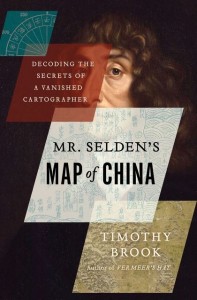
“[A] fascinating tale…[Brook] weaves a wonderful tale of the interaction of peoples of a different age in lands where sovereignty was barely concept.” – Economist
“A finely woven story, situating the map’s production and use at the intersection of Chinese enterprise and European curiosity. [Brook] is especially fascinated with the fusion of technical skills necessary to make a map at the juncture of these worlds. His account is . . . a gracefully rendered and highly personal early modern itinerary occasioned by an unusual Chinese map whose features form around not an imperial dynasty but a thriving oceanic culture. Brook takes us into these unsettled waters, with the benefit of long experience of this region of the world. Migrating through many different hands, the Selden map becomes our portolan, guiding us wherever we need to go . . . An enjoyable and elegant micro-history.” – The Nation
The Troubled Empire: China in the Yuan and Ming Dynasties
By: Timothy Brook (Department of History, UBC)
Harvard University Press, March 2013
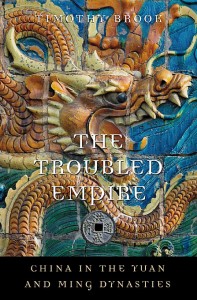
The Mongol takeover in the 1270s changed the course of Chinese history. The Confucian empire—a millennium and a half in the making—was suddenly thrust under foreign occupation. What China had been before its reunification as the Yuan dynasty in 1279 was no longer what it would be in the future. Four centuries later, another wave of steppe invaders would replace the Ming dynasty with yet another foreign occupation. The Troubled Empire explores what happened to China between these two dramatic invasions.
If anything defined the complex dynamics of this period, it was changes in the weather. Asia, like Europe, experienced a Little Ice Age, and as temperatures fell in the thirteenth century, Kublai Khan moved south into China. His Yuan dynasty collapsed in less than a century, but Mongol values lived on in Ming institutions. A second blast of cold in the 1630s, combined with drought, was more than the dynasty could stand, and the Ming fell to Manchu invaders.
Against this background—the first coherent ecological history of China in this period—Timothy Brook explores the growth of autocracy, social complexity, and commercialization, paying special attention to China’s incorporation into the larger South China Sea economy. These changes not only shaped what China would become but contributed to the formation of the early modern world.
The Poet Zheng Zhen (1806-1864) and the Rise of Chinese Modernity
By: J.D.Schmidt (Department of Asian Studies, UBC)
Brill, 2013
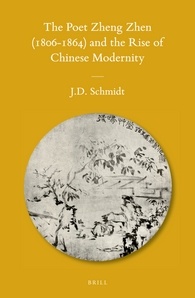 In The Poet Zheng Zhen (1806-1864) and the Rise of Chinese Modernity, J. D. Schmidt provides the first detailed study in a Western language of one of China’s greatest poets and explores the nineteenth-century background to Chinese modernity, challenging the widely held view that this is largely of Western origin. The volume contains a study of Zheng’s life and times, an examination of his thought and literary theory, and four chapters studying his highly original contributions to poetry on the human realm, nature verse, narrative poetry, and the poetry of ideas, including his writings on science and technology. Over a hundred pages of translations of his verse conclude the work.
In The Poet Zheng Zhen (1806-1864) and the Rise of Chinese Modernity, J. D. Schmidt provides the first detailed study in a Western language of one of China’s greatest poets and explores the nineteenth-century background to Chinese modernity, challenging the widely held view that this is largely of Western origin. The volume contains a study of Zheng’s life and times, an examination of his thought and literary theory, and four chapters studying his highly original contributions to poetry on the human realm, nature verse, narrative poetry, and the poetry of ideas, including his writings on science and technology. Over a hundred pages of translations of his verse conclude the work.
當代西方漢學研究集萃: 中古史卷 [Selected Contemporary Western Scholarship on Chinese Studies]
By: Leo K. Shin (Department of Asian Studies/History, UBC)
上海古籍出版社, 2012
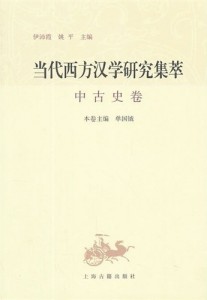 The goal of Selected Contemporary Western Scholarship on Chinese Studies (Dang dai xi fang Han xue yan jiu ji cui), a five-volume series published by the highly-regarded Shanghai Ancient Books Publishing House, is to bring to the attention of Chinese readers some of the central intellectual concerns of historians of China in the West. The volume on the “mid-ancient period,” for which I am responsible, is designed to take into account the long stretch of time between the fall of the Han dynasty in the early third century to the so-called High Qing era in the eighteenth century, an admittedly nearly-impossible task (why the volume on “modern history” ultimately failed to materialize is itself a story of note). Since I cannot possibly include all that I deem worthy, I have chosen to highlight in this volume the historian’s perennial concerns about time and space—how should one talk about time in China, and how should one make sense of the space we call “China”?
The goal of Selected Contemporary Western Scholarship on Chinese Studies (Dang dai xi fang Han xue yan jiu ji cui), a five-volume series published by the highly-regarded Shanghai Ancient Books Publishing House, is to bring to the attention of Chinese readers some of the central intellectual concerns of historians of China in the West. The volume on the “mid-ancient period,” for which I am responsible, is designed to take into account the long stretch of time between the fall of the Han dynasty in the early third century to the so-called High Qing era in the eighteenth century, an admittedly nearly-impossible task (why the volume on “modern history” ultimately failed to materialize is itself a story of note). Since I cannot possibly include all that I deem worthy, I have chosen to highlight in this volume the historian’s perennial concerns about time and space—how should one talk about time in China, and how should one make sense of the space we call “China”?
Critics and Commentators: The Book of Poems as Classic and Literature
By: Bruce Rusk (Department of Asian Studies, UBC)
Harvard University Press, 2012
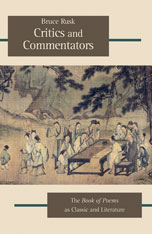 This book explores the mutual influence of literary and classicizing approaches, which frequently and fruitfully borrowed from one another. Drawing on a wide range of sources including commentaries, anthologies, colophons, and inscriptions, Bruce Rusk chronicles how scholars borrowed from critics without attribution and even resorted to forgery to make appealing new ideas look old. By unraveling the relationships through which classical and literary scholarship on the Book of Poems co-evolved from the Han dynasty through the Qing, this study shows that the ancient classic was the catalyst for intellectual innovation and literary invention.
This book explores the mutual influence of literary and classicizing approaches, which frequently and fruitfully borrowed from one another. Drawing on a wide range of sources including commentaries, anthologies, colophons, and inscriptions, Bruce Rusk chronicles how scholars borrowed from critics without attribution and even resorted to forgery to make appealing new ideas look old. By unraveling the relationships through which classical and literary scholarship on the Book of Poems co-evolved from the Han dynasty through the Qing, this study shows that the ancient classic was the catalyst for intellectual innovation and literary invention.
China: A New Cultural History
By: Cho-yun Hsu. Translated by Timothy D. Baker Jr. and Michael S. Duke
Columbia University Press, June 2012
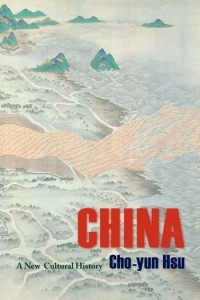
An internationally recognized authority on Chinese history and a leading innovator in its telling, Cho-yun Hsu constructs an original portrait of Chinese culture. Unlike most historians, Hsu resists centering his narrative on China’s political evolution, focusing instead on the country’s cultural sphere and its encounters with successive waves of globalization. Beginning long before China’s written history and extending through the twentieth century, Hsu follows the content and expansion of Chinese culture, describing the daily lives of commoners, their spiritual beliefs and practices, the changing character of their social and popular thought, and their advances in material culture and technology. In addition to listing the achievements of emperors, generals, ministers, and sages, Hsu builds detailed accounts of these events and their everyday implications. Dynastic change, the rise and fall of national ambitions, and the growth and decline of institutional systems take on new significance through Hsu’s careful research, which captures the multiple strands that gave rise to China’s pluralistic society. Paying particular attention to influential relationships occurring outside of Chinese cultural boundaries, he demonstrates the impact of foreign influences on Chinese culture and identity and identifies similarities between China’s cultural developments and those of other nations.
Overseas Chinese in the People’s Republic of China [中华人民共和国的归侨]
By: Glen Peterson (Department of History, UBC)
English: Taylor & Francis; Chinese: 印尼民族建设基金会 & 香港印尼研究学社, 2012
Overseas Chinese in the People’s Republic of China examines the experiences of a group of persons known officially and collectively in the PRC as “domestic Overseas Chinese”. They include family members of overseas migrants who remained in China, refugees fleeing persecution, and former migrants and their descendants who “returned” to the People’s Republic in order to pursue higher education and to serve their motherland. In this book, Glen Peterson describes the nature of the official state project by which domestic Overseas Chinese were incorporated into the economic, political and social structures of the People’s Republic of China in the 1950s, examines the multiple and contradictory meanings associated with being “domestic Overseas Chinese”, and explores how “domestic Overseas Chineseness” as political category shaped social experiences and identities.
This book fills an important gap in the literature on Chinese migration and Chinese transnationalism and will be an invaluable resource to students and scholars of these subjects, as well as Chinese history and Asian Studies more generally.
The Monkey and the Inkpot: Natural History and Its Transformations in Early Modern China
By: Carla Nappi (Department of History, UBC)
Harvard University Press, 2009
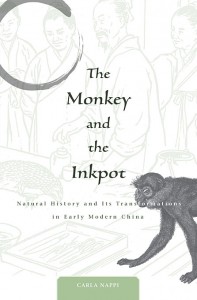
This is the story of a Chinese doctor, his book, and the creatures that danced within its pages. The Monkey and the Inkpot introduces natural history in sixteenth-century China through the iconic Bencao gangmu (Systematic materia medica) of Li Shizhen (1518–1593).
The encyclopedic Bencao gangmu is widely lauded as a classic embodiment of pre-modern Chinese medical thought. In the first book-length study in English of Li’s text, Carla Nappi reveals a “cabinet of curiosities” of gems, beasts, and oddities whose author was devoted to using natural history to guide the application of natural and artificial objects as medical drugs. Nappi examines the making of facts and weighing of evidence in a massive collection where tales of wildmen and dragons were recorded alongside recipes for ginseng and peonies.
Nappi challenges the idea of a monolithic tradition of Chinese herbal medicine by showing the importance of debate and disagreement in early modern scholarly and medical culture. The Monkey and the Inkpot also illuminates the modern fate of a book that continues to shape alternative healing practices, global pharmaceutical markets, and Chinese culture.
Recent Faculty Interviews
The Ancient Art of Falling Down: Vaudeville Cinema between Hollywood and China
This conversation between Henry Jenkins, a media scholar who works primarily on American popular culture, and Christopher Rea, a cultural historian of China, explores comic convergences on the silver screen, focusing on filmmakers who embraced a vaudevillian aesthetic of visceral comedy and variety entertainment. It offers a guided tour of cinematic comedy in comparative perspective, drawing out resonances between Hollywood and Chinese films from the 1910s to the 1950s. During the conversation, Rea and Jenkins show clips from a variety of films, from early works by Charlie Chaplin to the short-lived era of cinematic satire in Mao’s China.
